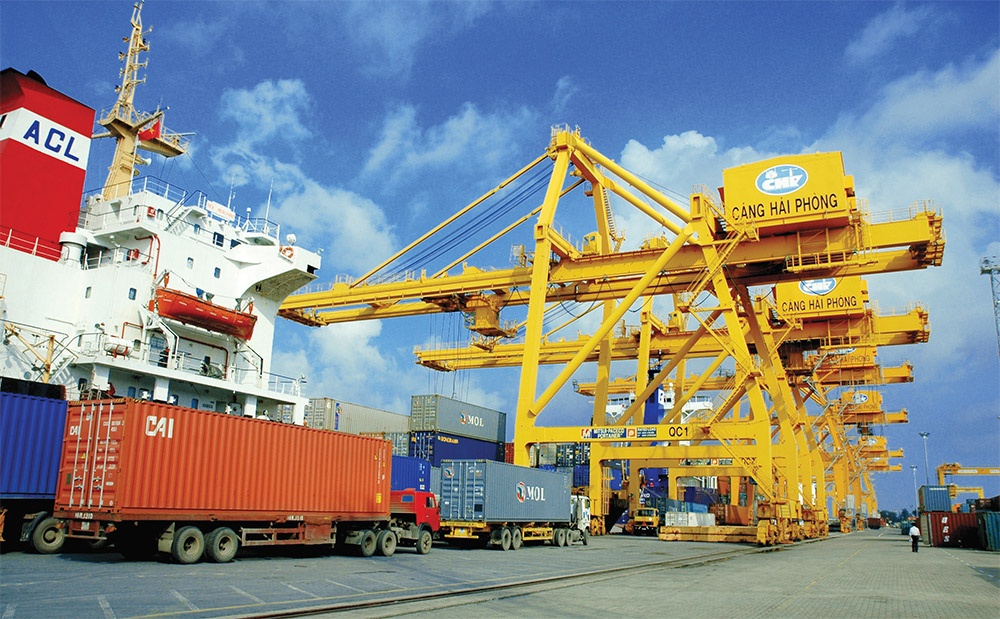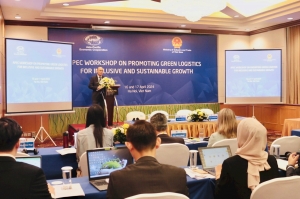Levelling up green logistics requires a helping hand
Konoike Vinatrans Logistics is expanding its business in Vietnam, and sees growing demand for cold chain services. A member of Konoike Group, one of the oldest logistics groups in Japan, it was the first Japanese logistics company in Vietnam, founded in 1996.
General director Kawase Kohichi told VIR, “We have boosted our presence in Vietnam by expanding our car fleet, providing a wide range of services, and opening many branches. We plan to expand to the cold chain market and other services in the northern region.”
The Japanese firm is expanding its sales channels to Vietnamese and foreign companies as well. It plans to strengthen logistics services to the whole of Vietnam, such as creating chilled and frozen warehouses as well as other temperature-controlled and regular warehouses.
Like Konoike Vinatrans, other international logistics companies are eyeing new opportunities in Vietnam, with green logistics being part of their strategies.
Flying from the Philippines to attend an APEC workshop on green logistics in Hanoi last week, Jade Adrienne Hugo, co-founder of electric vehicle delivery group Mober, sees many opportunities in Vietnam, which is promoting the development of electric vehicles (EVs), and plans to have some sort of presence in this country sooner rather than later.
Mober is the first amongst third-party delivery service providers to offer EVs in the Philippines, benefitting from owning its own fleet, to address the growing demand for green delivery options coming from international and domestic brands.
Elsewhere, FedEx sees opportunities for sustainable and inclusive growth in logistics by building a green ecosystem, trade facilitation, industry cooperation, and collaboration.
Rebecca Orme, legal managing director, Southeast Asia of FedEx Express, took ASEAN’s EV market as an example. The regional market size is expected to grow from $8.6 million in 2023 to $3.5 billion by 2028.
“We need to manufacture EVs at scale, charging infrastructure needs to be supported by sufficient power in the grid, and energy used must be from more renewables,” she said.
“Aviation needs additional solutions, like durable carbon capture strategies, to help address the emissions that would remain even after aggressive emission reduction efforts within logistics providers,” she continued.
FedEx is boosting its presence in Vietnam by opening new services to tap into the country’s increases in investment and trade activities. Last October, the company inaugurated a new flight route aimed at enhancing intercontinental package delivery services between Vietnam and key markets across Asia, the Middle East, Africa, and Europe.
Nguyen Thi Phuong Hien, from the Transport Development and Strategy Institute under Vietnam’s Ministry of Transport, said at the APEC workshop that logistics was contributing more to national GDP than ever before. The sector is working on greening the transport system with the overall objective to develop a net-zero green transportation system by 2050.
“The key strategies in aviation are improving cargo terminals and logistics services, widening air cargo terminals at the biggest airports, establishing cargo airlines, constructing Long Thanh International Airport, and improving connectivity to Tan Son Nhat Airport,” she said.
Dr. Shang-Min Lin, assistant professor at National Taiwan Ocean University, added that maritime transport was the backbone of international trade and the global economy. Over 80 per cent of the volume of international trade in goods is carried by sea, and the percentage is even higher for most developing economies.
“The industry’s greenhouse gas emissions, which account for 3 per cent of the global total, have increased by 20 per cent over the last decade. Without action, emissions could reach 130 per cent of their 2008 levels by 2050,” Lin said.
Despite the opportunities, green logistics in Vietnam still faces many problems. Ngo Khac Le, deputy secretary general of the Vietnam Logistics Business Association, said that the logistics service growth rate had reached 15-20 per cent and its contribution to GDP has hit 5-6 per cent. However, the transport sector emits 28 per cent of all GHG emissions.
“The financial capacity of businesses is the greatest challenge, greatly affecting the green logistics development process,” he said. “Over 98 per cent of businesses in Vietnam are small- and medium-sized, and 99 per cent of those are facing capital difficulties.”
Le added that the other obstacle was a shortage of high-quality human resources. By 2030, the logistics industry needs an additional 2.2 million employees, including about 200,000 high-quality logistics human resources with professional qualifications and foreign language abilities.
“The quality of ports and transportation infrastructure is also poor. Planning and transportation networks are not optimal, and modes of transport have not been planned and used appropriately, which causes congestion and overload,” Le explained. “Worse still, the level of IT application in logistics is still low. Regulations and policies are more focused on the transport sector as compared to other logistics sectors.”
Regulations encouraging the use of renewable resources, recycling, and eco-friendly packaging need to be pushed further, Le said.
 |
| Infrastructure for seaports and other transportation must be improved to benefit from green processes |
| Kuncoro Harto Widodo, vice dean, Agricultural Technology Universitas Gadjah Mada (Indonesia) In our pursuit of a sustainable future, it is imperative to prioritise the promotion of green logistics. This entails aligning our efforts with the overarching goals of the green economy, with a focus on enhancing environmental quality, building resilience to disasters and climate change, and fostering low-carbon development. By integrating environmentally friendly practices into every facet of the logistics industry, we can contribute to the preservation of our planet while fostering economic growth. To mitigate greenhouse gas emissions in the freight sector, there should be a comprehensive truck modernisation programme like the one inspired by Indonesia’s economic roadmap. This initiative aims to incentivise truck owners to upgrade their fleets, thereby replacing outdated and polluting vehicles with modern trucks equipped with state-of-the-art engine efficiency and emission control technologies. Through a series of targeted governmental programmes, we will facilitate the transition to a cleaner and more efficient fleet, ultimately reducing emissions and improving air quality across the nation. The government will introduce financial incentives and subsidies to encourage truck owners to invest in modernisation efforts. These incentives may include tax breaks, grants, and low-interest loans, making it economically feasible for stakeholders to embrace sustainable practices. We will collaborate with industry partners to facilitate the adoption of advanced technologies in the transportation sector. This will involve providing technical assistance, training programmes, and support for research and development initiatives aimed at enhancing the efficiency and sustainability of truck fleets. In tandem with incentive programmes, we will implement stringent regulations to phase out the use of older, high-emission vehicles. By setting emissions standards and imposing penalties for non-compliance, we will create a regulatory environment that incentivises the adoption of cleaner technologies and practices. In addition to modernising truck fleets, we recognise the importance of upgrading logistics facilities such as freight terminals, seaports, and airports. By investing in this, we can enhance the efficiency of our networks while minimising environmental impacts. Jiraroth Sukolrat, deputy director general Office of Transport, Traffic Policy, and Planning, Ministry of Transport (Thailand) There are three priorities in formulating the development strategies to improve transport efficiencies by using sustainable transport and the balancing of triangular concepts. The first one is green and safe transport. These two utilise the green innovations, freight transportation technologies and alternative fields. Secondly, inclusive transport ensuring equabilities, affordability and accessibility to people from all walks of life by applying universal and service design across the transport system. Lastly, efficient transport to improve transportation and logistics efficiency by reducing logistics costs, which nowadays is about 14 per cent of the GDP of Thailand. Moreover, Thailand is going to reduce that and we will enhance regional connectivity. There is a basic framework analysing the external effects as to why green logistics has not been successful in many countries, including Thailand. Firstly, there is a lack of comprehensive policy frameworks and also changes in government that could result in policy discontinuity. The second factor is economics. The country does not have sufficient funds to switch from the international internal combustion to electric vehicles. And the government also has a limited budget to provide incentives to the public for a project to ease things extensively. Third is the social aspect, as there is a lack of public awareness concerning climate change, and there are also pervasive constraints in widespread education about it. Finally, technologies are crucial. As Thailand cannot develop its own technologies, we must import technologies and policies, leading to increased expenses. This is a hurdle for entrepreneurs, contemplating an adoption of eco-friendly technologies because we have a lot of smaller enterprises in Thailand and also in Vietnam, and they cannot afford to change technologies to adapt their business to upgrade. |
 | Green logistics remain a taxing endeavour Vietnam’s logistics businesses are advancing on a green path connected with digital transformation, but are also in a highly energy-intensive and polluting industry, raising concerns about the long-term sustainability and financial viability of the sector, experts have said. |
 | Green logistics is unavoidable Experts have gathered at the APEC Workshop on Promoting Green Logistics for Inclusive and Sustainable Growth 2024 to assess the opportunities and challenges of implementing green logistics for businesses. |
What the stars mean:
★ Poor ★ ★ Promising ★★★ Good ★★★★ Very good ★★★★★ Exceptional
Related Contents
Latest News
More News
- Hermes joins Long Thanh cargo terminal development (February 04, 2026 | 15:59)
- SCG enhances production and distribution in Vietnam (February 04, 2026 | 08:00)
- UNIVACCO strengthens Asia expansion with Vietnam facility (February 03, 2026 | 08:00)
- Cai Mep Ha Port project wins approval with $1.95bn investment (February 02, 2026 | 16:17)
- Repositioning Vietnam in Asia’s manufacturing race (February 02, 2026 | 16:00)
- Manufacturing growth remains solid in early 2026 (February 02, 2026 | 15:28)
- Navigating venture capital trends across the continent (February 02, 2026 | 14:00)
- Motivations to achieve high growth (February 02, 2026 | 11:00)
- Capacity and regulations among British areas of expertise in IFCs (February 02, 2026 | 09:09)
- Transition underway in German investment across Vietnam (February 02, 2026 | 08:00)

 Tag:
Tag:




















 Mobile Version
Mobile Version